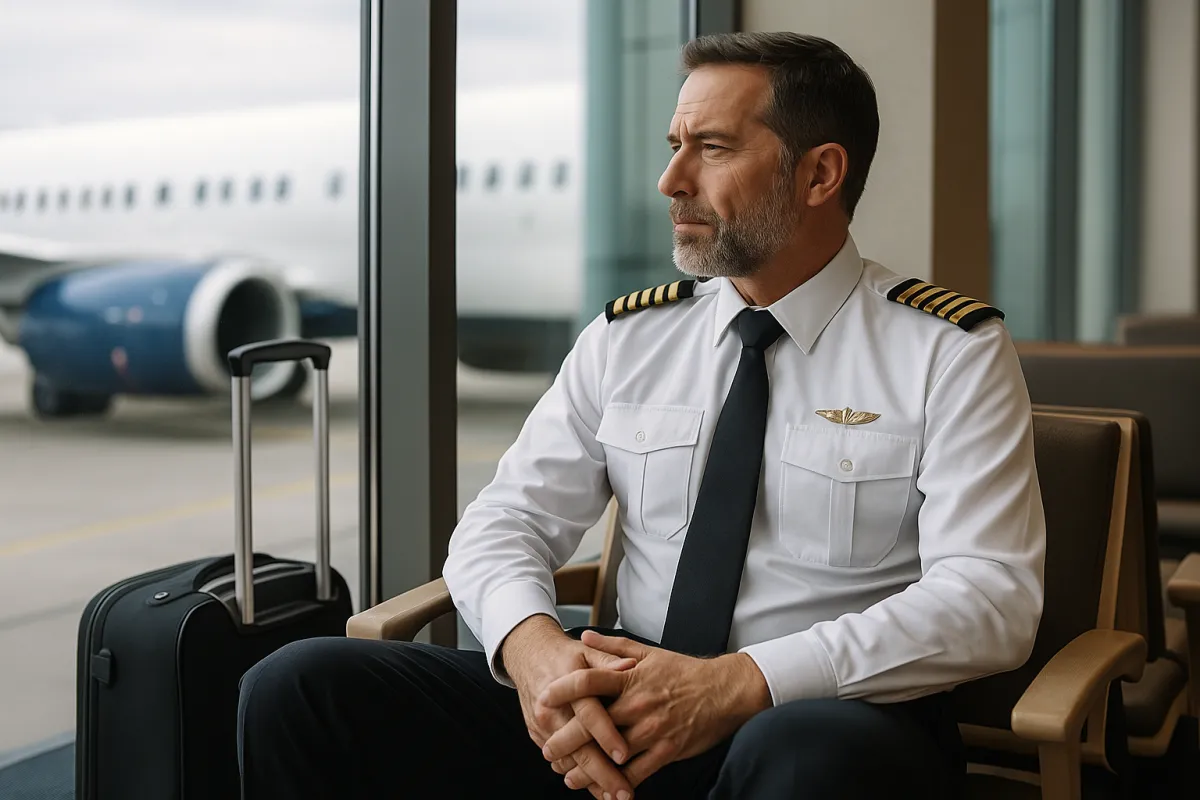Blog

How Much Do Pilot Mental Health Services Typically Cost?
How Much Do Pilot Mental Health Services Typically Cost Per Month on Average?
Navigating the landscape of mental health services can be complex, and for pilots, understanding the financial aspect is crucial. This article aims to shed light on the typical monthly costs associated with pilot mental health therapy, explore factors influencing these expenses, and provide strategies for managing costs effectively. We will also delve into the benefits of investing in specialized services and where pilots can find reliable, cost-effective support.
What Are the Typical Monthly Costs for Pilot Mental Health Therapy?
The monthly cost of mental health therapy for pilots can vary significantly based on the type of service, the therapist's specialization, and whether insurance coverage is utilized. Generally, costs can range from a few hundred dollars to over a thousand dollars per month.
How Much Does Individual Therapy for Pilots Usually Cost?
Individual therapy, where a pilot meets one-on-one with a mental health professional, is a cornerstone of personalized mental health care. The cost per session for individual therapy can vary widely, typically ranging from 100to250 per session [1, 2]. Some specialized aviation mental health providers, such as Emerald Mental Health, list their individual therapy sessions at around 129for50minutes∗∗[3].Forapilotattendingweeklysessions,thiscouldtranslatetoamonthlycostof∗∗400 to $1,000, assuming four sessions per month. However, this is a general estimate, and actual costs can be higher or lower depending on the therapist's credentials, experience, and demand.
Factors influencing individual therapy costs include:
•Therapist's Specialization: Therapists with specific expertise in aviation psychology or those who understand the unique stressors faced by pilots may charge a premium for their specialized knowledge and experience [4].
•Geographic Location: Costs can differ significantly based on the region or state. For instance, average therapy session rates in 2023-2024 varied from as low as 122toashighas227 across different states in the U.S. [2]. Major metropolitan areas or regions with a higher cost of living generally have higher therapy rates.
•Session Length: While a standard therapy session is typically 50 minutes, longer sessions or specialized treatments may incur additional costs.
•Therapist's Credentials and Experience: Highly experienced therapists, those with advanced degrees (e.g., Ph.D., Psy.D., LCSW, LMFT), or those with specific certifications often command higher fees.
What Are the Costs of Group Therapy and Support Sessions for Pilots?
Group therapy and support sessions offer a more cost-effective alternative to individual therapy, providing a supportive environment where pilots can share experiences and coping strategies with peers facing similar challenges. While specific figures for pilot-focused group therapy are less commonly advertised, general group therapy sessions can range from 50to150 per session [5].
For a pilot attending weekly group sessions, the monthly cost could be 200to600. The lower cost per person is due to the therapist facilitating a session with multiple clients simultaneously. Group therapy can be particularly beneficial for pilots as it fosters a sense of community and reduces the feeling of isolation often associated with the profession [6].
How Does Medication Management Affect Monthly Mental Health Expenses?
Medication management, typically overseen by a psychiatrist or a psychiatric nurse practitioner, involves prescribing and monitoring psychiatric medications. The costs associated with medication management are separate from therapy sessions and can add to a pilot's overall monthly mental health expenses. Initial psychiatric evaluations can range from 200to500, while follow-up appointments for medication management typically cost 75to200 per session [7].
If a pilot requires monthly medication adjustments or monitoring, this could add an additional 75to200 to their monthly mental health budget. These costs can be influenced by the provider's specialization, location, and whether the services are covered by health insurance.
Which Factors Influence the Cost of Aviation Mental Health Services?
Several factors beyond the type of service directly impact the overall cost of mental health care for pilots. Understanding these can help pilots make informed decisions and manage their expenses effectively.
How Does Therapist Specialization in Aviation Affect Pricing?
Therapists who specialize in aviation psychology or have extensive experience working with pilots often charge higher fees. This premium reflects their unique expertise in understanding the specific stressors, regulatory environment (e.g., FAA regulations), and lifestyle demands of the aviation profession [8]. Their specialized knowledge can lead to more effective and tailored treatment, potentially reducing the overall duration and cost of therapy in the long run. However, it's important to weigh the benefits of specialized care against the increased cost.
What Role Does Session Frequency Play in Monthly Costs?
The frequency of therapy sessions is a direct determinant of monthly costs. While weekly sessions are common, some pilots may require more intensive support (e.g., twice a week) during acute periods of distress or crisis, while others may transition to bi-weekly or monthly sessions as they progress. More frequent sessions will naturally lead to higher monthly expenses. Pilots and their therapists can collaboratively determine the optimal session frequency based on clinical need and financial considerations.
How Do Telehealth Platforms Affect Accessibility and Pricing?
Telehealth platforms have revolutionized access to mental health care, particularly for pilots who often have demanding travel schedules and may be based in remote locations. Online counseling can sometimes be more affordable than in-person sessions due to reduced overhead costs for therapists [9]. Additionally, telehealth offers:
•Increased Accessibility: Pilots can access therapy from anywhere with an internet connection, eliminating travel time and costs.
•Greater Flexibility: Scheduling appointments around flight duties becomes easier, reducing the need for time off or disruptions to work.
•Wider Selection of Therapists: Pilots are not limited to therapists in their immediate vicinity, allowing them to find specialists who understand aviation mental health, even if they are located in a different state [10].
While some platforms offer subscription models that can reduce per-session costs, it's essential to verify that the therapist is licensed in the pilot's state of residence and that the platform adheres to strict confidentiality and HIPAA compliance standards.
Does Location or Insurance Coverage Change Pilot Therapy Expenses?
Yes, both geographical location and insurance coverage significantly impact pilot therapy expenses.
•Location: As mentioned earlier, therapy costs vary by state and even within different cities in the same state. Urban areas typically have higher rates than rural areas [2].
•Insurance Coverage: Health insurance can substantially reduce out-of-pocket costs for mental health services. Many health insurance plans, including those provided by employers or unions, offer coverage for therapy and medication management. However, coverage varies widely:
•In-network vs. Out-of-network: In-network providers have contracted rates with insurance companies, leading to lower costs for the patient. Out-of-network providers may require the patient to pay the full fee upfront and then seek reimbursement from their insurance provider.
•Deductibles and Copayments: Pilots will typically need to meet a deductible before insurance coverage kicks in, and then pay a copayment or coinsurance for each session.
•Specific Exclusions: Some policies may have limitations or exclusions for certain types of therapy or providers. It's crucial for pilots to contact their health insurance provider directly to understand their mental health benefits, including coverage for aviation-specific therapy or telehealth services.
How Can Pilots Reduce Their Mental Health Therapy Costs?
Managing the cost of mental health care is a valid concern for many pilots. Fortunately, several strategies can help reduce expenses without compromising the quality of care.
What Mental Health Insurance Plans Cover Pilot Therapy Services?
Many health insurance plans, including those offered by major carriers like Blue Cross Blue Shield, Aetna, Cigna, and UnitedHealthcare, provide coverage for mental health services. The extent of coverage, however, depends on the specific plan. Pilots should:
•Review their policy documents: Look for sections on mental health or behavioral health benefits.
•Contact their insurance provider: Call the member services number on their insurance card to inquire about coverage for psychotherapy, counseling, and medication management. Ask about deductibles, copayments, and whether there are limitations on the number of sessions or types of providers.
•Inquire about out-of-network benefits: If a specialized aviation therapist is out-of-network, ask about reimbursement rates for out-of-network providers.
•Check for Employee Assistance Programs (EAPs): Many airlines and employers offer EAPs that provide a limited number of free counseling sessions to employees and their families. These programs are confidential and can be a great starting point for seeking support.
Are There Affordable Subscription Models for Pilot Mental Health Care?
Some telehealth platforms and mental wellness apps offer subscription-based models that can provide more affordable access to mental health support. These models often include:
•Unlimited Messaging: Access to a therapist via text messaging, which can be a cost-effective way to receive ongoing support.
•Reduced Session Rates: Lower per-session costs for video or phone therapy compared to traditional pay-per-session models.
•Bundled Services: Some subscriptions may include access to mental health resources, mindfulness exercises, or group support sessions.
While these models can be convenient and budget-friendly, pilots should carefully evaluate the services offered and ensure that the platform connects them with licensed professionals who can address their specific needs, especially those related to aviation mental health.
How Do Employer or Union Benefits Help Offset Therapy Costs?
Many airlines and pilot unions recognize the importance of mental health and offer benefits that can significantly offset therapy costs. These may include:
•Comprehensive Health Insurance: Robust health insurance plans with strong mental health benefits, often covering a significant portion of therapy and medication management costs.
•Employee Assistance Programs (EAPs): As mentioned, EAPs provide free, confidential counseling for a limited number of sessions. These are an excellent resource for initial support or short-term issues.
•Pilot Peer Support Programs: While not directly financial, these programs offer invaluable emotional support and guidance, often reducing the need for formal therapy or complementing it effectively.
•Wellness Programs: Some employers offer broader wellness programs that include mental health components, such as stress management workshops or access to mental health resources.
Pilots should thoroughly investigate all available employer and union benefits to maximize their access to affordable mental health care.
What Are the Benefits of Investing in Specialized Pilot Mental Health Services?
While the cost of specialized pilot therapy services may seem higher upfront, the long-term benefits often outweigh the initial investment. These services are tailored to the unique demands of the aviation profession, offering targeted support that can significantly enhance a pilot's well-being and career longevity.
How Does Early Intervention Improve Pilot Well-Being and Safety?
Investing in specialized mental health services facilitates early intervention, which is critical for pilots. Addressing mental health concerns at their nascent stage can prevent them from escalating into more severe conditions that could jeopardize a pilot's career or, more importantly, flight safety. Early intervention leads to:
•Faster Recovery: Addressing issues early often results in quicker and more effective treatment outcomes.
•Reduced Career Impact: Minor issues are less likely to lead to medical grounding or prolonged absence from flight duties.
•Enhanced Safety: A mentally healthy pilot is a safer pilot, capable of optimal decision-making and performance under pressure.
Why Is Confidentiality Important for Pilot Mental Health Therapy?
Confidentiality is paramount in pilot therapy therapy. Pilots often fear that disclosing mental health concerns could lead to the loss of their medical certificate and, consequently, their livelihood. Specialized pilot therapy services understand these fears and prioritize strict confidentiality protocols, often operating within frameworks that protect a pilot's privacy while adhering to necessary aviation regulations. This assurance of confidentiality encourages pilots to seek help without fear of professional repercussions, fostering trust and open communication.
How Does Specialized Therapy Address Unique Pilot Stressors?
Specialized therapy for pilots goes beyond general mental health care by directly addressing the unique stressors inherent in the aviation profession. These include:
•Flight Duty Demands: Coping with irregular schedules, jet lag, and long periods away from home.
•Performance Pressure: Managing the immense responsibility for passenger safety and the constant scrutiny of performance.
•Regulatory Compliance: Navigating complex FAA and international aviation mental health regulations.
•Isolation: Dealing with periods of loneliness and separation from family and social support networks.
Specialized therapists can provide targeted coping strategies, resilience training, and support that are directly applicable to a pilot's professional life, leading to more effective and sustainable outcomes.
Where Can Pilots Find Reliable and Cost-Effective Mental Health Services?
Finding the right mental health support is crucial. Pilots have several avenues to explore for reliable and cost-effective services.
What Are the Top Telehealth Platforms for Pilot Mental Health Care?
Telehealth platforms have become increasingly popular for their convenience and accessibility. While not all platforms specialize in aviation mental health, many offer a wide range of licensed therapists. Some popular platforms include:
•BetterHelp: A widely used online counseling platform offering access to licensed therapists via video, phone, and messaging. While not aviation-specific, pilots can search for therapists with relevant experience.
•Talkspace: Similar to BetterHelp, Talkspace provides online therapy and medication management services. Users can choose from a network of licensed therapists.
•Specialized Aviation Mental Health Providers: Some practices, like Emerald Mental Health, focus specifically on aviation professionals, offering tailored telehealth services. These providers often have a deeper understanding of the unique challenges faced by pilots.
When choosing a telehealth platform, pilots should prioritize those that ensure strict confidentiality, HIPAA compliance, and connect them with licensed professionals who can address their specific needs, especially those related to aviation mental health.
How to Choose the Right Therapist for Aviation Mental Health Needs?
Selecting the right therapist is a personal decision, but for pilots, certain considerations are particularly important:
•Aviation Specialization: Ideally, seek a therapist who has experience or specialized training in aviation psychology. They will understand the unique pressures, regulations, and culture of the industry.
•Licensure and Credentials: Ensure the therapist is licensed in your state and possesses the appropriate credentials (e.g., Ph.D., Psy.D., LCSW, LMFT).
•Confidentiality Practices: Discuss their confidentiality protocols, especially concerning FAA reporting requirements, to ensure your privacy is protected.
•Therapeutic Approach: Look for a therapist whose approach aligns with your needs (e.g., CBT for anxiety, EMDR for trauma).
•Compatibility: A strong therapeutic relationship is crucial. Many therapists offer a free initial consultation to assess compatibility.
Are There Pilot-Specific Mental Health Resources and Support Networks?
Yes, several organizations and networks are dedicated to supporting pilot therapy:
•Pilot Peer Support Programs: Many airlines and pilot unions have established peer support programs where pilots can connect with trained colleagues who offer confidential support and guidance.
•Aviation Mental Health Organizations: Non-profit organizations and professional associations often provide resources, directories of aviation-savvy therapists, and educational materials.
•FAA Resources: The FAA has been increasing its focus on pilot therapy and offers resources and guidance for pilots seeking support.
•Online Forums and Communities: While not formal therapy, online communities can provide a sense of connection and shared experience with other pilots facing similar challenges.
These resources, combined with professional therapy, can create a comprehensive support system for pilots navigating mental health challenges.

Stephen Rought, LCSW
Proudly Accepting
Aetna and Medicare Insurance


Disclaimer
Stephen Rought, LCSW does not guarantee any specific outcome. All content provided on the Stephen Rought, LCSW website is provided for educational or informational purposes only. Consult medical professionals you are working with about whether any opinions or recommendations provided through this website apply to you and your unique circumstances
Currently, all online therapy sessions are conducted using the HIPPA compliant Telehealth service doxy.me
SErvices
Individual Therapy
Parent Coaching
Financial Therapy
Couples Counseling
Family Therapy
